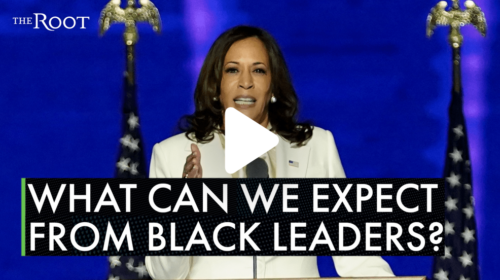Marc Lamont Hill on Black Elected Officials and Why the Political System Prevents Progressive Politics From Being Articulated
Share
Explore Our Galleries
Breaking News!
Today's news and culture by Black and other reporters in the Black and mainstream media.
Ways to Support ABHM?
By Felice León, theroot.com
Black Americans have seen some historic wins in the 2020 election.
Cori Bush became the first Black woman to represent Missouri in Congress. Middle school principal Jamaal Bowman took home a “W” for New York’s 16th Congressional District. And, of course, Vice President-elect Kamala Harris will become the first woman and first Black person to be sworn in as vice president of the United States of America.
We out here.
Despite our (collective) excitement, media studies professor and author Marc Lamont Hill remains vigilant.

“I’m also always cautious that we not invest too much in Black elected leadership,” Hill tells The Root. The Philadelphia native says part of the issue is that the American political systems do not allow for a radical politic.
“When you have Black people elected in Congress, every two years, you’ve got to be reelected. So if you’re not playing ball with the Democratic establishment, if you’re not being responsive to some of the special interests, then it’s very easy for them to primary you,” said Hill.
The We Still Here: Pandemic, Policing, Protest author says that in addition to the political system, ideology is a factor in determining whether or not a radical politic can be articulated.
“We can’t presume that Black elected leadership has a radical or progressive vision just because they’re Black,” said Hill. “A Black prosecutor is still working within a system that criminalizes. A Black police chief, is still operating within a system that normalizes the militarized presence of policing.”
Read the full article and watch Marc Lamont Hill’s take on this here.
Learn more about roadblocks for the Black community here.
More Breaking News here









Comments Are Welcome
Note: We moderate submissions in order to create a space for meaningful dialogue, a space where museum visitors – adults and youth –– can exchange informed, thoughtful, and relevant comments that add value to our exhibits.
Racial slurs, personal attacks, obscenity, profanity, and SHOUTING do not meet the above standard. Such comments are posted in the exhibit Hateful Speech. Commercial promotions, impersonations, and incoherent comments likewise fail to meet our goals, so will not be posted. Submissions longer than 120 words will be shortened.
See our full Comments Policy here.